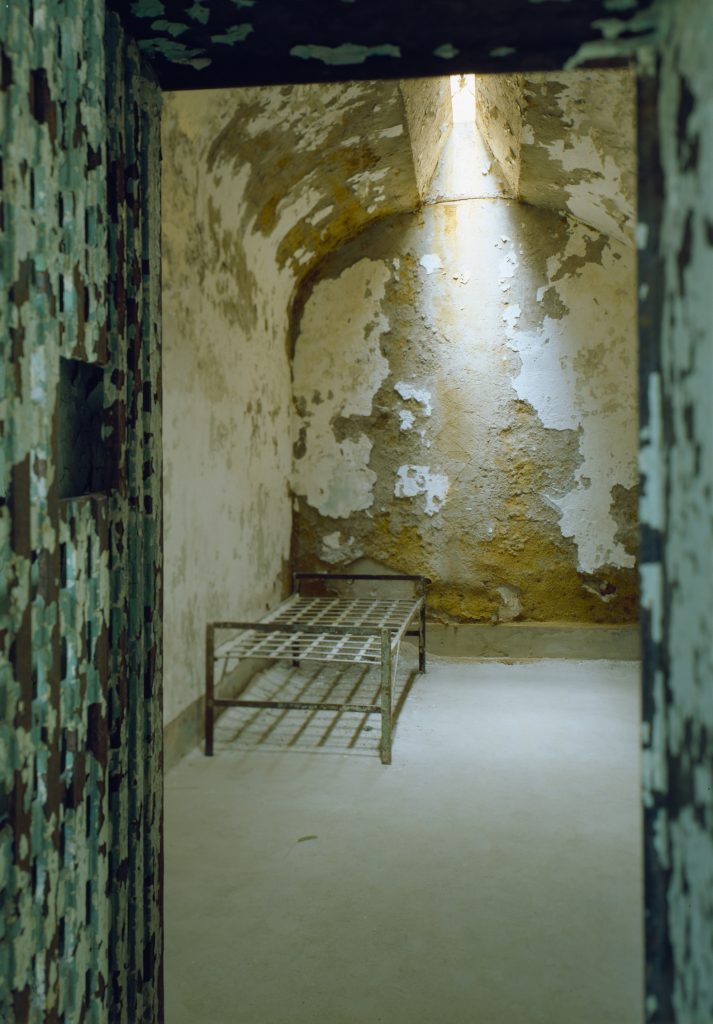Jane Brox has written, elegiacally, of growing up on her family’s Massachusetts apple farm in “Here and Nowhere Else,” “Five Thousand Days Like This One,” and “Clearing the Land.” Her nonfiction book on the evolution of artificial light is the aptly named “Brilliant.”
Her newest work — fitting for Lent — is called “Silence: A Social History of One of the Least Understood Elements of Our Lives.”
The first takeaway (perhaps unintended) is a new awareness of the hideous tortures imposed by humans upon other humans in the name of “correction.”
Brox opens with Philadelphia’s Eastern State Penitentiary, established in 1829 as an experiment in prison rehabilitation. Each cell was essentially what we would today term a Special Housing Unit (SHU).
“[D]uring the period of their confinement, no one shall see or hear, or be seen or heard by any other human being,” ran a portion of the prison’s mission statement.
Inmates at Eastern State and a similar institution, Auburn State Prison in Maine, were not allowed to communicate with one another, to talk at all, ever, or to make any kind of noise for years on end at the threat of being publicly lashed, thrown into a lightless dungeon, or in one case, having a metal bit thrust into his mouth with such force that the prisoner died within the hour (after which the warden was exonerated of all wrongdoing).
Women “scolds” in Puritan times were whipped, branded, or subjected basically to waterboarding. Brox describes a Catholic boys’ reform school in Rome, circa early 1700s, toward which today Child Protective Services and the police would be sprinting with warrants.
Examples of this punitive, enforced silence are juxtaposed with the “silence” of monasteries, convents, and cloisters, peopled by those who for the most part have chosen to be there.
Interestingly, however, Brox refuses to hold that all “punitive” silence is bad, and all monastic silence is good.
Predictably perhaps, she writes glowingly of Thomas Merton, a monk whose contemplative life made him a figure of international fame.

More interesting to me was Eugenia Ginzburg (1904-1977), a mother, wife, educator, and Communist journalist who was caught up in the Stalinist purges starting in 1934. She spent two years in a tiny prison cell, some in solitary confinement, then 18 years at hard labor in the Siberian gulag.
In her memoir of that time, “Journey Into the Whirlwind,” she wrote: “When a human being is isolated from the ‘rat-race’ of the everyday life, he achieves a kind of spiritual serenity. Sitting in a cell, one no longer has any call to pursue the phantom of worldly success, to play the diplomat or the hypocrite, to compromise with one’s conscience. One can immerse oneself in the lofty problems of existence, and do so with a mind purified by suffering.”
Then again, many prisoners sentenced to such extreme confinement and isolation go insane. Moreover, monastic silence as well can become “distorted,” “restrictive,” a “muteness” rather than a communication.
Whatever the case, for extreme introverts, or those extra-sensitive to noise, today’s world can seem its own kind of prison cell.
Our dwindling wilderness is ripped apart by the abrasive roar of airplanes, ATVs, and snowmobiles; our urban days by leaf blowers, our middle-of-the-night musings by screaming jacked-up motorcycles the very purpose of which, apparently, is to disturb the world’s peace.
Cultivating silence may not be a stand-alone virtue. But as the Swiss writer Max Picard observed, “Silence … stands outside the world of profit and utility.”
In fact, I have a theory that the longevity of any given man-made monument is directly proportional to the noise level required to build it. Think of the Pyramids, Stonehenge, medieval abbeys.
Then consider our own LACMA, which is now razing four “aging” buildings (built barely 50 years ago) and erecting new ones — you can be sure with the aid of excavators, bulldozers, backhoes, trenchers, scrapers, and all other manner of behemoth earth-moving vehicles aimed to strike fear and loathing into the silence-loving heart.
Of her own longing for silence, Brox writes: “I know one thing for certain: silence will not present itself unbidden amidst the noise of the world. If I want it, I have to make space for it and there is always a choice to make that space. …
“The decision to seek silence is the beginning of the encounter, with all its attendant hopes and destabilizations. And in our time now, every decision in favor of silence is profound, even if it involves no more than deliberately turning away other things for hours or days in a week.”
From the British prison Reading Gaol, where he served two years for gross indecency, Oscar Wilde observed: “Suffering is one long moment. We cannot divide it by seasons. … It seems to circle round one centre of pain. … For us there is only one season, the season of sorrow. The very sun and moon seem taken from us.”
That’s true of our suffering whether we’re in or out of prison. Whatever our situation, we can hold in prayer all those who, craving human company, are sentenced to silence; and all those who, craving a moment of silence, are sentenced to ceaseless noise.
Heather King is a blogger, speaker and the author of several books. For more, visit heather-king.com.
SPECIAL OFFER! 44 issues of Angelus for just $9.95! Get the finest in Catholic journalism with first-rate analysis of the events and trends shaping the Church and the world, plus the practical advice from the world’s best spiritual writers on prayer and Catholic living, along with great features about Catholic life in Los Angeles. Subscribe now!

